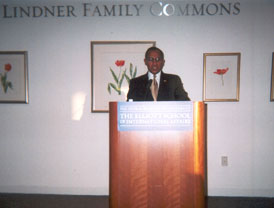
|
AMBASSADOR SUBASINGHE SPEAKS AT THE AMBASSADOR'S
FORUM AT THE ELLIOT SCHOOL OF INTERNATIONAL AFFAIRS, Speaking on "Sri Lanka: Prospects
for Peace," Ambassador Subasinghe highlighted that the domestic
consensus for peace
Ambassador Devinda R. Subasinghe, Sri Lanka's Ambassador to the United States, was the guest speaker at the "Ambassador's Forum Series" at The Elliot School of International Affairs, George Washington University. The Forum provides a unique venue for Ambassadors from all regions of the world to present their views to the George Washington University community comprising both students and faculty. Previous speakers in the Fall series included the Ambassador of Sweden, His Excellency Jan Eliasson. Invited guests included members of the US government, think - tanks, the media and the Embassy Staff. The forum was Chaired by Ambassador Karl F. Inderfurth, former Assistant Secretary of State for South Asian Affairs and currently Director, International Affairs Program at the Elliot School of International Affairs. In his address, the Ambassador provided a profile of the country's twenty year old conflict, current efforts at resolution of the ethnic problem, the role of the international community and recent political developments in Sri Lanka. Speaking on the current constitutional impasse in the country, the Ambassador mentioned that the peace process was not in jeopardy as there is a strong commitment on the part of the present Government and the President for a peaceful resolution of the conflict. Further, there seem to be an increased appreciation among the United National Front Government and the People's Alliance of the need to make co-habitation work and for adopting a bipartisanship approach to dealing with critical national issues, such as the ethnic problem. The Ambassador highlighted that the current political situation is, in part, a natural concomitant of the workings of the 1978 Constitution. According to Ambassador Subasinghe, the best prospects for peace lay in the mandate for peace given by the people of Sri Lanka and the unwavering support of the international community for a peaceful resolution of the conflict. Giving a realistic appraisal of the present situation in Sri Lanka, Ambassador Subasinghe said, "At present there is no war, nor peace in Sri Lanka. The risks need to be mitigated in the near future." Providing insights and recommendations for continuing progress toward peace, the Ambassador said that the twenty-month ceasefire had resulted in increased economic growth, higher levels of investment and tourism arrivals and lower inflation, resulting in strengthening the country's economic prospects. "Therefore, the continuing ceasefire, the ongoing dialogue between the President and the Prime Minister and the budget being debated despite the deadlock over the defense portfolio, are salutary factors in what seems like a challenging situation," said the Ambassador. Embassy of Sri Lanka 08 December 2003
|
Statements | Features | Reports & Publications | Archive | Contact I Ideas Line
